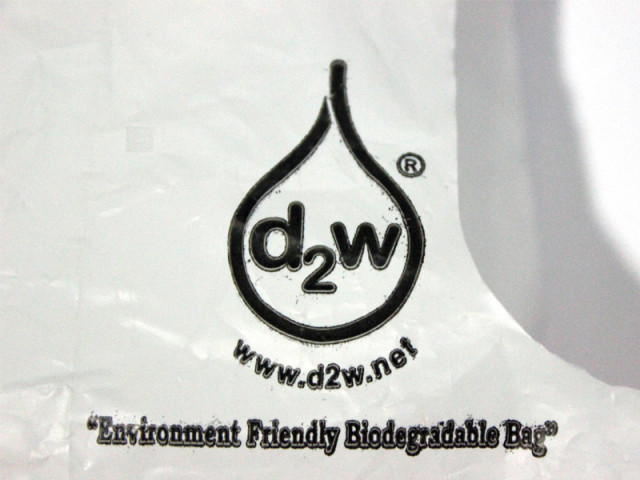Biodegradable bags guarantee a greener future for Islamabad
Shopkeepers, manufacturers could face charges for defying new regulation.

Shopkeepers, manufacturers could face charges for defying new regulation.
The agency’s efforts began when the Ministry of Law and Justice notified the Prohibition of Non degradable Plastic Bags (Manufacture, Sale, Use) Regulation 2013 earlier this year.
Under the regulation, which will take effect from April 1, regular plastic bags will be replaced by “oxo biodegradable” ones that decompose quickly.
Shopkeepers and manufacturers defying the new regulation could face charges at an environmental tribunal.
The traditional polythene plastic bags take centuries to decompose naturally, release carcinogenic fumes when they are burned, choke water drains and also pose a risk to wild animals.
According to Pak-EPA, Pakistan uses 350 bags per head per annum on average.

For Islamabad, the number rises to a staggering 350 million bags each year, of which a significant percentage end up clogging drains and littering streets some distance from the city’s only landfill site.
Pak-EPA’s initial efforts have resulted in some success. The Utility Stores Corporation (USC) agreed to use the biodegradable bags and has even experimented with a prototype.
Pak-EPA Director-General Asif Shuja said USC was now moving to the tendering and production phase.
Brands like Dawn Bread and KFC have already adopted eco-friendly measures while other corporate firms have responded positively to the regulation.
“Companies who are making honest efforts to switch to oxo biodegradable bags will be given more time to do so,” Shuja said.
However, corporate sector cooperation notwithstanding, small-scale manufacturers may still pose a risk if they continue to sell non-degradable plastic bags.
In a bid to address this problem, Pak-EPA has focused on enforcement — Islamabad’s four plastic bag manufacturing plants have assured they will shift to biodegradable bag production.
The oxo biodegradable bag manufacturing process is the same as that for regular plastic bags, except that the additive ‘olefin’ is mixed with the polyethylene raw material.
The olefin allows bacteria to decompose the weak molecular structure of the plastic, Shuja said.
Eco-friendly bags cost only Rs0.5 more than non-degradable ones, despite an existing six per cent import duty on olefins.
The Oxo-Biodegradable Plastics Association, a UK-based organisation, has donated field-testing equipment to Pak-EPA which will be used to confirm that the bags being sold are biodegradable.
The association has designated an expert to train and assist Pak-EPA staff on technical matters, Shuja said.
Plastic bag manufacturers are required to register with Pak-EPA to ensure the olefin they use meets the quality standards.
The oxo biodegradable bags come with a logo — “d2w,” a brand for biodegradable plastic, inscribed in a water drop.
Shuja said increasing demand for biodegradable bags will keep shopkeepers, who will have no choice but to boost supply stocks, on their toes. While reaching that level of awareness, especially at the grassroots level, may take some time, at least the first step towards building an eco-friendly future has begun.
Published in The Express Tribune, April 1st, 2013.



















COMMENTS
Comments are moderated and generally will be posted if they are on-topic and not abusive.
For more information, please see our Comments FAQ